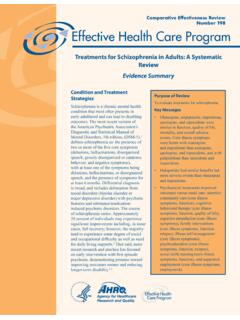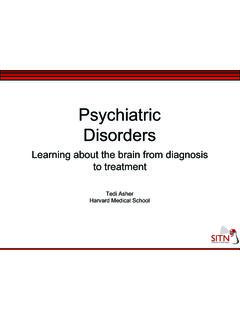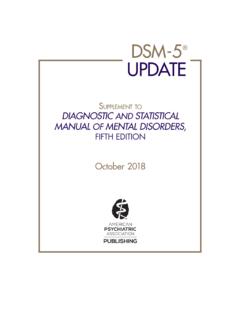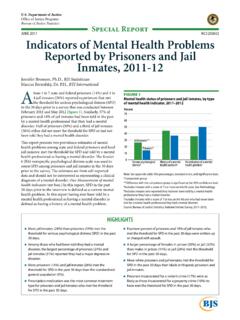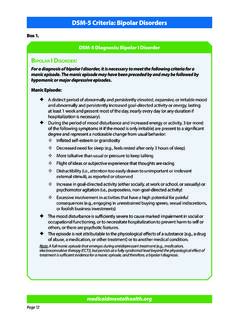Transcription of ADHD Diagnosis and Screening in Adults - ADHD Institute
1 adhd Diagnosis and Screening in AdultsClinical assessment using the ASRS Screening ScaleDate of preparation: March 2018 Job code: C-ANPROM/INT//1949 Shire 2018. All rights reserved. SHIRE and the Shire logo are registered trademarks of Shire Pharmaceutical Holdings Ireland Limited or its affiliates. This booklet is intended for healthcare professionals outside of the US only. Mean worldwide prevalence of adhd is estimated at (range ) in adhd in childhood and adolescence is acknowledged to persist into adulthood in ~50 66% of The European Consensus Statement on the Diagnosis and treatment of adult adhd acknowledges that many Adults with adhd may be - There may be a lack of recognition/misunderstanding of adult - Adults with adhd may adjust their behaviour in order to cope with - Associated psychiatric comorbidities may hide/mask symptoms of ,7 Psychiatric comorbidities are common in adult ,8-10 - An analysis of the World Health Organization World Mental Health Surveys reported that of Adults with adhd had a comorbid, mood, anxiety, substance-use or behavioural disorder and that ~9% of adult patients with mood disorders or anxiety have - An observational study of newly diagnosed Adults with adhd (n=367)
2 Found that on average psychiatric comorbidities were present at the time of first Diagnosis and that of the sample had a least one psychiatric - A population-based survey of adult twins born in Sweden (n=17,899) found that symptoms of adhd were associated with an increased risk for symptoms of (odds ratio [95% confidence interval]) generalised anxiety disorder ( [ ]), major depression ( [ ]), bipolar disorder ( [ ]), obsessive-compulsive disorder ( [ ]) and alcohol dependence ( [ ]), with no significant difference between - The National Comorbidity Survey Replication of US Adults (aged 18 44 years) identified 3199 cases of adult adhd using a two-part diagnostic Commonly reported psychiatric comorbidities and their associated odds ratios (95% confidence interval) included: mood disorders ( [ ]), anxiety disorders ( [ ]), substance-use disorders ( [ ]) and impulse-control disorders ( [ ]).
3 10 Diagnosing adhd in Adults The impact of adhd can be felt at home11,12 and in the workplace,12-14 and may put a strain on relationships11,12 with family, friends and colleagues. adhd can also be associated with substantial financial burden for individuals and societal healthcare ,15-17 There is currently no single tool used for the Diagnosis of adhd . Formal Diagnosis is made using evidence accumulated from the initial clinical assessment and medical classification ,19 Formal assessment and Diagnosis should only be made by appropriately qualified healthcare professionals, such as specialist psychiatrists, specialist nurses, or other qualified healthcare professionals, who have training and expertise in the Diagnosis of There are two main classification systems for diagnosing adhd : American Psychiatric Association s Diagnostic and Statistical Manual of Mental disorders 5th Edition (DSM-5 )20 and the the International Classification of Mental and Behavioural disorders 10th revision (ICD-10).
4 21 These medical classification systems may be used alone or in conjunction with a range of rating ADHDThis booklet is a guide only there are a variety of rating scales available to assess the symptoms, behaviour and impacts on functioning/development associated with adhd . Page 2 Page 3 This booklet is a guide only there are a variety of rating scales available to assess the symptoms, behaviour and impacts on functioning/development associated with adhd . NeverRarelySometimesOftenVery oftenScoring: Never = 0 for all questions; however, the scores for higher responses vary with each question, with maximum scores of 5 for questions 1 and 2, 4 for question 5, 3 for question 6, and 2 for question 4. Total scores are in the possible range of 0 to score of 14 or higher is suggestive of adhd ( sensitivity, specificity).25 ADULT SELF-REPORT SCALE (ASRS) Screening SCALE: A NEW SCREENER BASED ON DSM-5 TMThe ASRS symptom checklist22,23 was first developed by the World Health Organization, and contains 18 questions based on the 18 category A symptoms from the The ASRS Screening scale was developed from this and contains 6 of the 18 questions that were most predictive of adhd , and these correspond to the 6 questions in part A of the full ASRS symptom ,23In 2017, the ASRS Screening scale was updated to ASRS by revising the 6 DSM-IV questions to 4 questions based on the DSM-5TM (questions 1 4) and 2 non-DSM-5TM questions (questions 5 and 6).
5 25 The scale is short, easily scored and has been shown to correctly identify Adults who meet the diagnostic criteria for adhd in both the general population and in a speciality treatment patient answers the questions below, rating each of the criteria shown using the scale on the right side of the page. As they answer each question, they should place an X in the box that best describes how they have felt and conducted themselves over the past 6 How often do you have difficulty concentrating on what people say to you, even when they are speaking to you directly? (DSM-5 A1c)2. How often do you leave your seat in meetings or other situations in which you are expected to remain seated? (DSM-5 A2b)3. How often do you have difficulty unwinding and relaxing when you have time to yourself? (DSM-5 A2d)4. When you are in a conversation, how often do you find yourself finishing the sentences of the people you are talking to before they can finish them themselves?
6 (DSM-5 A2g)5. How often do you put things off until the last minute? (Non-DSM)6. How often do you depend on others to keep your life in order and attend to details? (Non-DSM)Adapted with kind permission from Ustun B, Adler LA, Rudin C, et al. The World Health Organization Adult Attention-Deficit/Hyperactivity Disorder Self-Report Screening Scale for DSM-5. JAMA Psychiatry 2017; 74: 4 REFERENCES1. Fayyad J, Sampson NA, Hwang I, et al. The descriptive epidemiology of DSM-IV Adult adhd in the World Health Organization World Mental Health Surveys. adhd Atten Def Hyp Disord 2017; 9: Lara C, Fayyad J, de Graaf R, et al. Childhood predictors of adult attention-deficit/hyperactivity disorder: results from the World Health Organization World Mental Health Survey Initiative. Biol Psychiatry 2009; 65: 46-54. 3. Barkley RA, Fischer M, Smallish L, et al. The persistence of attention-deficit/hyperactivity disorder into young adulthood as a function of reporting source and definition of disorder.
7 J Abnorm Psychol 2002; 111: Faraone SV, Biederman J, Mick E. The age-dependent decline of attention deficit hyperactivity disorder: a meta-analysis of follow-up studies. Psychol Med 2006; 36: Kooij SJ, Bejerot S, Blackwell A, et al. European consensus statement on Diagnosis and treatment of adult adhd : The European Network Adult adhd . BMC Psychiatry 2010; 10: Weiss MD, Weiss JR. A guide to the treatment of Adults with adhd . J Clin Psychiatry 2004; 3: 27-37. 7. Kooij SJ, Huss M, Asherson P, et al. Distinguishing comorbidity and successful management of adult adhd . J Atten Disord 2012; 16 (5 Suppl): Pi eiro-Dieguez B, Balanz -Mart nez V, Garc a-Garc a P, et al. Psychiatric comorbidity at the time of Diagnosis in Adults with adhd : The CAT study. J Atten Disord 2016; 20: Friedrichs B, Igl W, Larsson H, et al. Coexisting psychiatric problems and stressful life events in Adults with symptoms of adhd --a large Swedish population-based study of twins.
8 J Atten Disord 2012; 16: 13-22. 10. Kessler RC, Adler L, Barkley R, et al. The prevalence and correlates of adult adhd in the United States: results from the National Comorbidity Survey Replication. Am J Psychiatry 2006; 163: Pitts M, Mangle L, Asherson P. Impairments, Diagnosis and treatments associated with attention-deficit/hyperactivity disorder ( adhd ) in UK Adults : results from the lifetime impairment survey. Arch Psychiatr Nurs 2015; 29: 56-63. 12. Brod M, Pohlman B, Lasser R, et al. Comparison of the burden of illness for Adults with adhd across seven countries: a qualitative study. Health Qual Life Outcomes 2012; 10: Biederman J, Faraone SV, Spencer TJ, et al. Functional impairments in Adults with self-reports of diagnosed adhd : A controlled study of 1001 Adults in the community. J Clin Psychiatry 2006; 67: de Graaf R, Kessler RC, Fayyad J, et al. The prevalence and effects of adult attention-deficit/hyperactivity disorder ( adhd ) on the performance of workers: results from the WHO World Mental Health Survey Initiative.
9 Occup Environ Med 2008; 65: Braun S, Zeidler J, Linder R, et al. Treatment costs of attention deficit hyperactivity disorder in Germany. Eur J Health Econ 2013; 14: Telford C, Green C, Logan S, et al. Estimating the costs of ongoing care for adolescents with attention-deficit hyperactivity disorder. Soc Psychiatry Psychiatr Epidemiol 2013; 48: 337-344. 17. Le HH, Hodgkins P, Postma MJ, et al. Economic impact of childhood/adolescent adhd in a European setting: the Netherlands as a reference case. Eur Child Adolesc Psychiatry 2014; 23: Taylor E, D pfner M, Sergeant J, et al. European clinical guidelines for hyperkinetic disorder first upgrade. Eur Child Adolesc Psychiatry 2004; 13 Suppl 1: NICE guideline 2018. Attention deficit hyperactivity disorder: Diagnosis and management. Available at: Last accessed March American Psychiatric Association. Diagnostic and Statistical Manual of Mental disorders , Fifth Edition.
10 Washington, DC: American Psychiatric Association, 2013. 21. World Health Organization. The ICD-10 Classification of Mental and Behavioural disorders . Available at: Last updated 1993; 1: 1-263. Last accessed March 2018. 22. Kessler RC, Adler L, Ames M, et al. The WHO ASRS: a short Screening scale for use in the general population. Psychol Med 2005; 35: Adult adhd Self-Report Scale ( ) Symptom Checklist. Available at: Last accessed March American Psychiatric Association. Diagnostic and Statistical Manual of Mental disorders , Fourth Edition, Text Revision. Washington, DC: American Psychiatric Association, Ustun B, Adler LA, Rudin C, et al. The World Health Organization Adult Attention-Deficit/Hyperactivity Disorder Self-Report Screening Scale for DSM-5. JAMA Psychiatry 2017; 74: booklet is a guide only there are a variety of rating scales available to assess the symptoms, behaviour and impacts on functioning/development associated with adhd .

